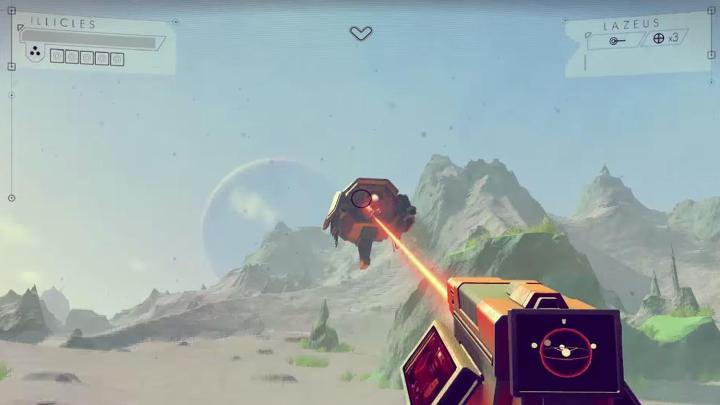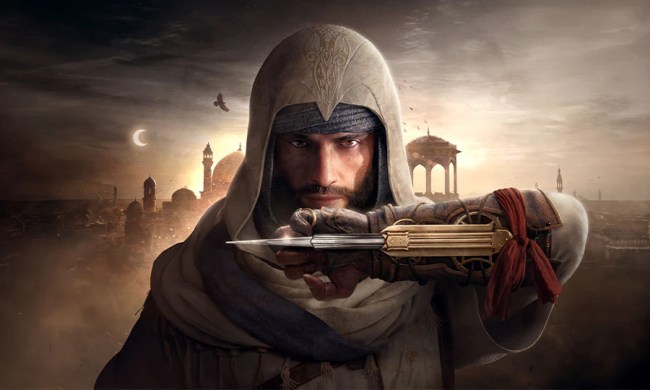
Destiny and No Man’s Sky bookended our appointment calendar for E3 2014. It’s a pairing that makes an elegant statement on what felt so exciting about this year’s show. One is a game from a long-established developer that pushes the notion of “massively multiplayer” into a Cloud-y stratosphere; the other aims to deliver player-authored stories in an unthinkably large, randomly generated galaxy that was created by a team of less than 10.
Two undisputed Best of Show contenders, one all-encompassing theme: innovation. From the asymmetrically balanced competitive play of Turtle Rock Studios’ Evolve to the unexpectedly dynamic world-building in Monolith Productions’ Middle-earth: Shadow of Mordor, E3 2014 smacked of fresh ideas. Even Advanced Warfare, the latest Call of Duty entry in Activision’s lumbering juggernaut of a franchise, takes a different tack, with an assortment of new mobility options that promise to significantly alter the flow of the multiplayer-focused game.
It’s easy to pin this torrent of box-breaking thinking to the arrival of new consoles. E3 2013’s hardware announcements wrought an inevitable lull as publishers held back their best stuff while the shiny, new machines stole all the fanfare. This year’s show was thus a sigh of a relief, a happy exhalation of “Look at what we can do now!” first looks that can flourish in a space that’s increasingly hungry for fresh content.
Microsoft and Sony both embraced a games-first approach, kicking off the show with a dizzying assault of trailers and reveals at their dueling Monday press conferences. From early looks at the returns of Uncharted and Crackdown, to exciting revelations about PlayStation Now, the future of Grand Theft Auto V, and new IP like Scalebound and Bloodborne, the two titans of industry seemed to remember that there’s no winning the battle for living room dominance unless there are games to play on their all-in-one boxes.

Meanwhile, Nintendo reminded fans and critics alike that it’s got one of the most robust and agile first-party portfolios in the industry; excitement for newcomers like Mario Maker, Splatoon, Code Name: S.T.E.A.M., and Captain Toad: Treasure Tracker is exceeded only by teasing insights into the future of the Zelda and Star Fox series’. And that’s not even mentioning the new Yoshi and Kirby games, or the off-the-wall Zelda re-imagining in Hyrule Warriors.
Third-party publishers and smaller indie devs weren’t completely out of the picture. No Man’s Sky is the most high-profile example of a pint-sized team aiming to deliver a larger-than-life experience, but others — Tales from the Borderlands and Inside, to name a couple — generated plenty of excitement as well. Teams at EA, Ubisoft, and Deep Silver also delivered an impressive list of up-and-comers for 2014 and beyond: Dead Island 2, Homefront: The Revolution, Assassin’s Creed: Unity, Rainbow Six: Siege, Far Cry 4, Star Wars: Battlefront, Mirror’s Edge 2, and Dragon Age: Inquisition.
If there’s any laggard coming out of E3 2014, it’s the still-developing virtual reality space. Oculus VR’s Rift amd Sony’s Morpheus were in attendance, but both seemed to take a backseat this year while consumer launch plans remain nebulous. There’s little doubt at this point: we won’t be seeing VR tech in retail stores until 2015, and that’s at the earliest. Oculus and Sony no doubt want to make a big splash when the new hardware does arrive, so this year’s E3 presence for VR was all about managing hype.
Speaking of hype management, that’s going to be a tricky thing going into the 2014 holiday season. While old standbys like Assassin’s Creed, Call of Duty, and Battlefield: Hardline are set to be joined by exciting prospects like Evolve and Middle-earth, many of the most anticipated titles that surfaced at this year’s show aren’t due until 2015 or later.

Will excitement for future releases impact holiday sales at all? It could, especially with more than a few delays pushing high-profile releases into 2015: Batman: Arkham Knight, The Witcher 3: Wild Hunt, Tom Clancy’s The Division, The Order: 1866, and Dying Light all won’t make their original 2014 release windows, nor will E3 2014 no-shows Mad Max and Quantum Break. And who knows what else will slip to next year before September arrives?
Established players like Call of Duty and Assassin’s Creed are still going to see big numbers, but it’s going to take some more hype-building during the summer months to grow anticipation for the fall’s promising newcomers. Evolve feels like a lock thanks to 2K Games’ heavy marketing blitz, but games like Shadow of Mordor and Alien: Isolation could be overlooked in favor of more established names, even re-releases like GTA V or “1.5” follow-ups like Borderlands: The Pre-Sequel.
As much as E3 2014 was dominated by the expected excitement that follows a hardware announce year, it’s the signs of fresh thinking that we should all be latching on to here. Some of the most promising interactive experiences may be a year or more away from surfacing — and let’s not forget that E3 is often filled with unkept promises — but this year’s lineup makes a clearer statement than we got last year on the forces shaping our games at the dawn of this latest hardware generation.


